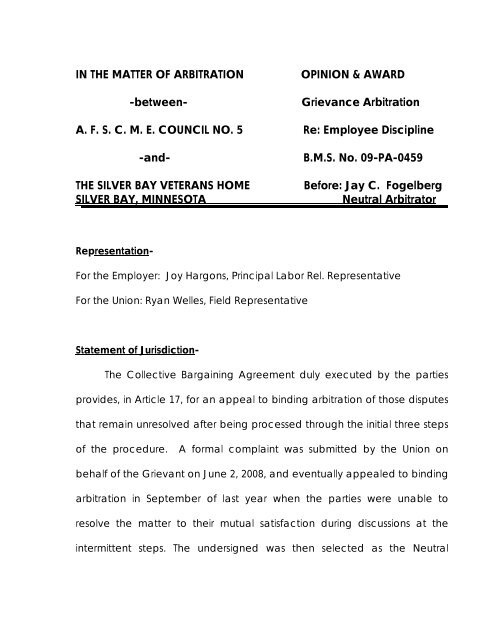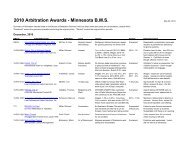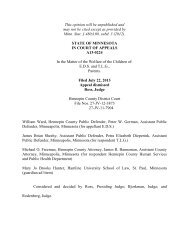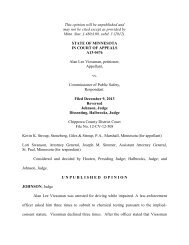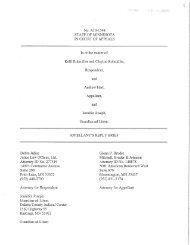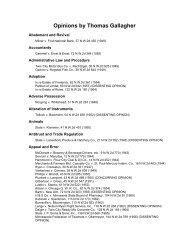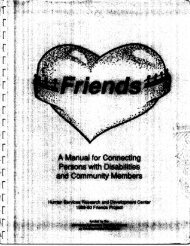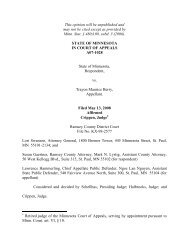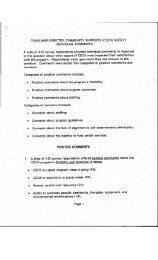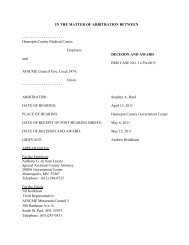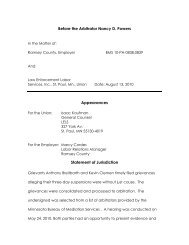IN THE MATTER OF ARBITRATION OPINION ... - Minnesota.gov
IN THE MATTER OF ARBITRATION OPINION ... - Minnesota.gov
IN THE MATTER OF ARBITRATION OPINION ... - Minnesota.gov
You also want an ePaper? Increase the reach of your titles
YUMPU automatically turns print PDFs into web optimized ePapers that Google loves.
<strong>IN</strong> <strong>THE</strong> <strong>MATTER</strong> <strong>OF</strong> <strong>ARBITRATION</strong> OP<strong>IN</strong>ION & AWARD<br />
-between- Grievance Arbitration<br />
A. F. S. C. M. E. COUNCIL NO. 5 Re: Employee Discipline<br />
-and- B.M.S. No. 09-PA-0459<br />
<strong>THE</strong> SILVER BAY VETERANS HOME Before: Jay C. Fogelberg<br />
SILVER BAY, M<strong>IN</strong>NESOTA Neutral Arbitrator<br />
Representation-<br />
For the Employer: Joy Hargons, Principal Labor Rel. Representative<br />
For the Union: Ryan Welles, Field Representative<br />
Statement of Jurisdiction-<br />
The Collective Bargaining Agreement duly executed by the parties<br />
provides, in Article 17, for an appeal to binding arbitration of those disputes<br />
that remain unresolved after being processed through the initial three steps<br />
of the procedure. A formal complaint was submitted by the Union on<br />
behalf of the Grievant on June 2, 2008, and eventually appealed to binding<br />
arbitration in September of last year when the parties were unable to<br />
resolve the matter to their mutual satisfaction during discussions at the<br />
intermittent steps. The undersigned was then selected as the Neutral
Arbitrator to hear evidence and render a decision from a panel provided to<br />
the parties by the <strong>Minnesota</strong> Bureau of Mediation Services. Subsequently, a<br />
hearing was convened in Duluth, <strong>Minnesota</strong> on July 13, 2009. There, the<br />
parties were afforded the opportunity to present position statements,<br />
testimony and supportive documentation. The hearing was then<br />
concluded on the same date. The parties have stipulated all matters in<br />
dispute are properly before the Arbitrator for resolution on their merits, and<br />
that the following constitutes a fair description of the issue.<br />
The Issue-<br />
Did the Employer have just cause to terminate the Grievant’s<br />
employment? If not, what shall the appropriate remedy be?<br />
Preliminary Statement of the Facts-<br />
The adduced evidence indicates that the Grievant, Jon Bolen, was a<br />
Human Services Technician assigned to the Silver Bay Veteran’s Home – a<br />
health care facility for veterans operated by the State (hereafter “Agency”,<br />
“Employer” or “Administration”). As such, he is represented by the<br />
<strong>Minnesota</strong> State Employees Union, A.F.S.C.M.E. Council 5 (“Union” or<br />
“Local”) who, together with the Administration has negotiated and<br />
−2−
executed a labor agreement (Joint Ex. 1) covering terms and conditions of<br />
employment for the approximate seventy-five support personnel<br />
that comprise the bargaining unit.<br />
Mr. Bolin was hired in June of 1996, and worked as a Health Service<br />
Technician (“HST”) during the entire period of his employment at the facility.<br />
In that capacity he was responsible for assisting “….residents by providing<br />
personal and restorative care in the activities of (their) daily living” (Joint Ex.<br />
4). He reported directly to whatever Charge Nurse who was on duty during<br />
the same shift. His daily tasks included assisting with the necessary personal<br />
and hygiene care of the residents as well as assisting with their feeding, fluid<br />
intake and following each of their individual care plans (id., p. 4).<br />
The facility at Silver Bay has an East and West arm where the residents<br />
are housed that flanks the main entrance/lobby. The evidence shows that<br />
on March 13, 2008, the Grievant was the only Tech assigned to bathe<br />
patients. While giving a bath to a resident in the East side of the facility, a<br />
Registered Nurse working the same shift, Sara Preston, asked Mr. Bolin<br />
whether he was planning on giving baths on the west arm that day as well.<br />
His response was that four different people had already asked him the<br />
same question and that he did not, “…..need you people telling me what<br />
to do” (Joint Ex. 6). After the Grievant grew angrier, raising his voice, Ms.<br />
−3−
Preston contacted another R. N. Tim Turk who was at the service station on<br />
the west wing to inquire whether Bolin was performing the bathing duties on<br />
both wings that day. Turk, in turn, contacted the Grievant asking if he was<br />
doing baths on the east arm as well as the west. At that point, the<br />
evidence shows that Mr. Bolin again exhibited irritation with the question<br />
and proceeded to locate Ms. Preston yelling at her that he knew how to do<br />
his job and then “stormed off into the tub room” (Joint Ex. 6).<br />
Shortly thereafter that morning, the Local Union President, Dorothy<br />
Miller, who was working at the facility, was approached by several HSTs who<br />
indicated that Mr. Bolin’s anger was escalating and that they were “afraid<br />
of him when he got angry” (id.). Ms. Miller then sought out the Director of<br />
Nursing, Pat Smedstad to inform her of the complaints she was receiving<br />
from other Techs. Smedstad, in turn, located the Grievant in the tub room,<br />
and explained that she needed to talk to him right away. According to the<br />
Director, Mr. Bolin’s voice became louder as he expressed his belief that he<br />
was “in trouble.” After the supervisor told him that he was being placed on<br />
leave while the matter was being investigated, he raised his voice again.<br />
She recalled that It grew louder as they walked down the main hallway.<br />
Bolin denied that he had done anything wrong, and that he was being<br />
“stereotyped” (id., at p. 6).<br />
−4−
As Ms. Smedstad was escorting Bolin out of the building, they passed<br />
the Chief Administrator’s office, Mike Bond, who heard the Grievant’s voice<br />
being raised and became concerned. He then decided to accompany<br />
Smedstad as he was being escorted to the door.<br />
Subsequently, the Administration interviewed twenty different<br />
employees who were working that morning or had worked with him in the<br />
past. They also obtained the Grievant’s version of the incident, and made<br />
a record of all responses (Joint Ex. 6). The Employer determined the<br />
investigation demonstrated that “one or more employees became fearful<br />
of their safety in the workplace due to (Bolin’s) verbal and non-verbal<br />
communications” that morning, and that prior attempts to alter his angry<br />
behavior had not produced the desired results (Joint Ex. 8). Accordingly, he<br />
was informed in a letter dated May 16, 2008, that his employment at the<br />
facility was being terminated (id.).<br />
Thereafter the Union filed a formal complaint on behalf of Mr. Bolin,<br />
alleging that he had been separated from service for less than just cause in<br />
violation of Article 16 of the Master Contract (Joint Ex. 15).<br />
−5−
Relevant Contractual & Policy Provisions-<br />
From the Master Agreement:<br />
Article 16<br />
Discipline & Discharge<br />
Section 1. Purpose: Disciplinary action may be imposed upon<br />
an employee only for just cause.<br />
* * *<br />
Section 3. Disciplinary Procedures: Disciplinary action or<br />
measures shall include only the following:<br />
1. oral reprimand;<br />
2. written reprimand;<br />
3. suspension;<br />
4. demotion; and<br />
5. discharge<br />
From the Employer’s Operating Policy:<br />
Objective-<br />
To maintain an environment which is free from threats and acts<br />
of violence. The agency will not tolerate acts of violence of any<br />
type, from any source. This includes threatening or violent<br />
actions by or to employees, residents, their family members,<br />
volunteers or any guests on our campuses.<br />
Definitions-<br />
Violence: the abusive or unjust exercise of power,<br />
intimidation, harassment and/or the threatened or actual use of<br />
force which results in or has a high likelihood of causing hurt,<br />
fear, injury, suffering or death.<br />
−6−
Workplace violence generally falls into three categories:<br />
1. A violent act or threat (perceived or real) by a current<br />
for former employee……or someone who has some<br />
involvement with a current or former employee, such as<br />
an employee’s spouse, significant other, relative or<br />
another person who has had a dispute with an<br />
employee.<br />
Positions of the Parties-<br />
The AGENCY takes the position in this matter that the termination of<br />
the Grievant’s employment was justified. In support, the Administration<br />
claims that on March 13 th last year, Mr. Bolin became extremely angry, raising<br />
his voice in front of fellow employees and patients as well, and slamming his<br />
fist down in disgust, when he was asked to about the bathing schedule and<br />
later when requested to vacate the premises. In fact his behavior was so<br />
loud and unpredictable that the facility’s Chief Administrator dropped what<br />
he was doing to assist in escorting him from the building that day. Further,<br />
the Employer maintains that Mr. Bolin has been the recipient of numerous<br />
counseling, coaching and training sessions over the past ten years in an<br />
effort to alter his behavior. This has included a recommendation that he<br />
attend anger management classes, and a written warning. They assert that<br />
Mr. Bolin has had multiple opportunities to comply with the published policies<br />
−7−
on workplace violence (for which he has received training) but to no avail.<br />
Indeed, it had become such a problem at the Silver Bay facility that his fellow<br />
employees grew fearful of working with him, and supervisors leery of directing<br />
him. Such unpredictable and angry behavior also has a negative impact on<br />
the residents of the home, and their families as well. Moreover, since his<br />
termination, the work environment has improved markedly. For all these<br />
reasons then, they ask that the grievance be denied in its entirety.<br />
Conversely, the UNION takes the position that Mr. Bolin’s discharge<br />
from his position at Silver Bay is without just cause. In support of their claim,<br />
the Local contends that the Grievant has been a relatively long-term<br />
employee who has compiled a good overall record. Further, they assert that<br />
when he has been counseled or warned about his angry outbursts and the<br />
need to get this type of behavior under control, he has responded favorably.<br />
His annual job evaluations in 2006 and again in 2008 demonstrate that he<br />
met every expectation of management. Additionally, the Union notes that<br />
Mr. Bolin has sought help for anger management from the Veteran’s<br />
Administration Clinic in Superior Wisconsin. As a veteran of the Gulf War, he<br />
suffers from post-traumatic stress disorder which manifests itself at times<br />
through angry outbursts. However, he has now learned to keep this under<br />
control. The Local contends that the Grievant, as a veteran who was injured<br />
−8−
in the war, is in a superior position to identify with many of the residents at the<br />
Silver Bay facility. On March 13 th last year he maintains that everyone was<br />
“on him” to perform the work of two HSTs, and that it simply became<br />
overwhelming as he would get conflicting directives from various supervisors.<br />
The Grievant maintains he was not made aware that he was the only<br />
employee giving baths that day, until he had been at work for<br />
approximately an hour. Accordingly, for all these reasons, the Local asks that<br />
their complaint be sustained, and that Mr. Bolin be returned to his former<br />
position and made whole.<br />
Analysis of the Evidence-<br />
In a disciplinary matter such as this, the employer is routinely assigned<br />
the initial burden of proof to demonstrate, in a clear and convincing<br />
fashion, that their decision was justified under the circumstances. It is widely<br />
held that management must first establish the accused employee is indeed<br />
guilty as charged. Should that be accomplished, they then need to show<br />
that the discipline administered was fair and reasonable when all relevant<br />
factors are considered (assuming, of course, that there is no language in<br />
the labor agreement that limits a neutral’s authority to review the penalty<br />
imposed).<br />
−9−
In this instance, following careful consideration of the testimony,<br />
supportive documentation and arguments presented, I conclude that the<br />
Agency has satisfied their primary evidentiary obligation – largely through<br />
the presentation of unrefuted facts.<br />
While Mr. Bolin denied behaving in an angry manner on the morning<br />
in question or otherwise raising his voice, the documentation and testimony<br />
indicates otherwise. No fewer than nine witnesses called by the Employer<br />
testified without challenge to the events of March 13 th, noting that the<br />
Grievant repeatedly shouted at his supervisors and fellow workers in front of<br />
some of the residents, while at times slamming his fist down to make a point.<br />
The evidence further indicates that a number of co-workers approached<br />
their Local Union Representative that same morning, telling her Bolin was<br />
“out of control,” and that they were concerned about their own safety and<br />
the safety of the residents. Their apprehension was so uniform and<br />
expressed in sufficient numbers that Ms. Miller sought out the Chief<br />
Administrator at the facility to advise him of what she had heard. Mr. Bond<br />
then witnessed for himself, the Grievant yelling as Director Smedstad<br />
attempted to escort him from the building. Indeed, Bond stated that he<br />
was concerned enough for Smedstad’s safety (and the safety of others)<br />
−10−
that he left his office to accompany her as she walked with Bolin while he<br />
retrieved his coat and then exited the facility.<br />
The Grievant’s response to the charges were to deny making any<br />
violent gestures or otherwise raising his voice on the morning of March 13 th<br />
last year. During his interview when the Administration was conducting their<br />
investigation, he also claimed that he was being “set up” by other<br />
employees, and that he had been “stereotyped” as a violent person (Joint<br />
Ex. 6). An examination of his employment history however, indicates<br />
otherwise.<br />
Supervisor Tim Turk testified that he had worked with Bolin two or three<br />
times a week over a protracted period of time at the facility. During that<br />
time he observed the Grievant calling fellow employees “fucking idiots.”<br />
Further, he observed his tirades at work characterizing them as exhibiting<br />
“volcanic anger,” and noting that sometimes Mr. Bolin would be<br />
“overwhelmed with anger.” Significantly, he noticed that at times this<br />
demonstration would take place in front of residents and visiting family<br />
members as well.<br />
John Altmann, another RN Supervisor at Silver Bay, testified that he<br />
has worked with the Grievant since he began his employment at the facility<br />
in 1996. During that time he stated that he has observed Bolin’s anger and<br />
−11−
outbursts with some frequency. He commented that the Grievant’s<br />
behavior would adversely affect the “work on the floor,” and that his fellow<br />
employees would often avoid him altogether for fear of being a recipient of<br />
his anger. This witness testified that he is a friend of Mr. Bolin’s outside of<br />
work, and has observed him on more than one occasion, bringing his anger<br />
into the Veterans’ Home when he reported to work. Notably this witness<br />
added that he was “uncomfortable” testifying against Mr. Bolin, but<br />
believes the Administration’s decision to terminate his employment was the<br />
“right thing to do” under the circumstances.<br />
Yet another Supervisor, Larry Gomer, testified regarding the job<br />
evaluations the Grievant has received in the past – many of which make<br />
specific mention of the “need to control (his) emotions during changes in<br />
daily routines, so expected results are obtained” (Joint Ex. 12; p. 6). He<br />
explained that he had been involved in an incident in 1997 which ultimately<br />
resulted in Bolin receiving a written disciplinary warning for his failure to<br />
conduct himself in a professional manner. The triggering events again<br />
involved angry outbursts and “inappropriate behaviors” on his part (Joint Ex.<br />
11). 1 Gomer added that during the investigative meeting with the Grievant<br />
at that time, he was so concerned that Bolin would “explode,” he<br />
1 The action was not grieved by the employee.<br />
−12−
positioned himself near a door to facilitate a quick exit should that become<br />
necessary.<br />
Additional documentation submitted more than supports the<br />
Employer’s contention that they have made numerous attempts to correct<br />
Mr. Bolin’s angry and sometimes violent behavior in an effort to preserve his<br />
employment with the Agency. The evidence demonstrates that within two<br />
years of being hired at the facility, the Administration began to counsel him<br />
for “slamming a hamper lid” (Joint Ex. 9), “swearing and calling another HST<br />
a prick” (id.), “negative body language and tone of voice” (Joint Ex. 13),<br />
and “swearing loudly and throwing a chart book” (Joint Ex. 10). He was<br />
also directed to attend anger management training in 2007, and warned<br />
that further outbursts would lead to accelerated discipline (id.). Notably,<br />
Joint Exhibit 14 reflects the fact that since 2000, the Grievant has received<br />
extensive training in self-discipline and emotional control which included<br />
such topics as “Anger Management,” “Workplace Violence” and “Stress<br />
Management.” Moreover, under cross-examination Mr. Bolin allowed that<br />
over the years, Management has made an effort to work with him through<br />
counseling and training, “on my problems.”<br />
In spite of the Employer’s rehabilitative efforts however, I am<br />
persuaded that the Grievant has continued to exhibit inappropriate<br />
−13−
ehavior that has caused both the Administration and his fellow employees<br />
continued concern for their safety and the safety of the residents as well.<br />
Mr. Bolin acknowledges the Agency’s repeated efforts to work with him<br />
relative to his anger management. Yet, to this day he maintains the<br />
response from the Administration and his fellow workers has been<br />
“exaggerated,” and that he still “does not think (he has) done anything<br />
wrong.”<br />
In light of the overwhelming documentation and testimony compiled<br />
in the record, I must respectfully disagree with the Grievant’s assessment.<br />
The objective evidence is manifestly contrary to his assertions. It<br />
demonstrates that repeated efforts to counsel, coach and warn Mr. Bolin his<br />
behavior needed to be altered in order to preserve his employment, have<br />
been largely ignored. The dour reality of the situation is that the Employer<br />
has made a reasonable and justifiable decision in this instance, and that<br />
the record is void of sufficient countervailing evidence that would support a<br />
lesser penalty.<br />
In Bell Helicopter Textron, 120 LA 1819 (2005), the arbitrator upheld a<br />
discharge of an employee where it was demonstrated he had engaged in<br />
threatening, abusive and intimidating behavior over a period of time, and<br />
where many employees refused to work with him. Similarly, in the instant<br />
−14−
case, many of the Grievant’s co-workers have come forward to express<br />
concern for their own safety when assigned to the same shift, to the extent<br />
it damaged morale in the past. Moreover, the Employer has asserted,<br />
without contravention, that other HSTs have indicated they would leave<br />
their jobs should he be returned. Finally, there is ample evidence that the<br />
work environment at the facility has improved noticeably since Mr. Bolin’s<br />
departure.<br />
Award-<br />
The foregoing analysis has demonstrated to my satisfaction that the<br />
Employer has established a clear and repeated violation of their operation<br />
policies by the Grievant. Their expectations of behavior in the workplace –<br />
which include appropriate interactions with employees and residents alike –<br />
have not been met despite numerous and repeated attempts to<br />
rehabilitate this employee. While I am most sympathetic to Mr. Bolin’s claim<br />
that he suffers from post-traumatic stress syndrome as a result of his service<br />
in the armed forces (a diagnosis however that was not documented on the<br />
record) this assertion must necessarily be contrasted with the balance of<br />
the evidence which has adequately proven that the decision to terminate<br />
−15−
his employment was both justified and reasonable. Accordingly, the<br />
grievance is denied.<br />
__________________<br />
Respectfully submitted this 22 nd day of July, 2009.<br />
________________________<br />
Jay C. Fogelberg, Neutral Arbitrator<br />
−16−


